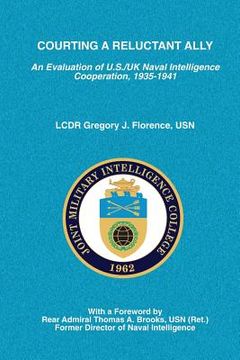Share
Courting A Reluctant Ally: An Evaluation of U.S./UK Naval Intelligence Cooperation, 1935-1941 (in English)
Usn Lcdr Gregory J. Florence
(Author)
·
Createspace Independent Publishing Platform
· Paperback
Courting A Reluctant Ally: An Evaluation of U.S./UK Naval Intelligence Cooperation, 1935-1941 (in English) - Florence, Usn Lcdr Gregory J.
$ 7.57
$ 9.59
You save: $ 2.02
Choose the list to add your product or create one New List
✓ Product added successfully to the Wishlist.
Go to My WishlistsIt will be shipped from our warehouse between
Friday, May 24 and
Monday, May 27.
You will receive it anywhere in United States between 1 and 3 business days after shipment.
Synopsis "Courting A Reluctant Ally: An Evaluation of U.S./UK Naval Intelligence Cooperation, 1935-1941 (in English)"
To most Americans alive today, the close alliance between the United States and Great Britain seems to be a "natural" thing, perhaps the inevitable expression of what Winston Churchill referred to as the "special relationship" occasioned by "underlying cultural unity." There are now few among us whose memories go back to the period between the two world wars and who would be able to point out that, commonalities of language and culture notwithstanding, today's special relationship between the United States and Great Britain is a quite recent phenomenon, really dating only from the 1940-41 timeframe. For much of the two and a quarter centuries of our independence, relationships with Great Britain have been cool or even strained. Cooperation and intelligence sharing with the British in World War I was late in coming and limited in scope. At the end of the war, it slowed to an almost imperceptible trickle, and was very slow to resume. The author outlines the factors accounting for the reluctance of both sides to share information and the underlying feeling of competitiveness between the Royal Navy and the U.S. Navy during the interwar years. This had moderated by the outbreak of hostilities in 1939, but within a year two different dynamics had arisen: the American concern after the fall of France that the British might be quickly defeated, and thus US technical and intelligence information compromised; and the British single-minded focus on bringing America into the war and gaining access to our vast technological and industrial resources. To further their goals, the British were willing to provide the United States with virtually unlimited access to British secrets-technological as well as intelligence-even without any quid pro quo. Their strategy worked. The author outlines how the exchange of information started as a trickle, turned into a flood, and endures to this day.
- 0% (0)
- 0% (0)
- 0% (0)
- 0% (0)
- 0% (0)
All books in our catalog are Original.
The book is written in English.
The binding of this edition is Paperback.
✓ Producto agregado correctamente al carro, Ir a Pagar.

